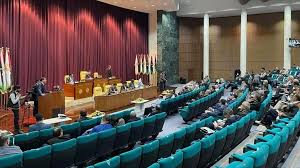
The Libyan Parliament and the Council of State are set to hold a series of high-level discussions this week to address the contentious issue of sovereign positions and the unification of anti-corruption bodies that remain split between the eastern and western regions of the country.
Amina Al-Mahjoub, a member of the Council of State, confirmed that the presidential office will convene an initial meeting with the Sovereign Positions Committee on Wednesday, followed by a joint session between the two institutions’ committees in Benghazi on Thursday.
She indicated that these meetings would prioritize whether to organize elections first or appoint key sovereign positions, a question already challenged by the UN envoy to Libya.
Al-Mahjoub emphasized the need to reform the composition of the High Electoral Commission to achieve greater institutional balance.
“The unification of these bodies is essential to ensure oversight of public funds and strengthen transparency,” she told Al-Masar TV.
She noted that two separate anti-corruption agencies currently operate in Tripoli and Benghazi, a division that undermines their effectiveness and fuels opaque practices and administrative dysfunction.
The official also stressed that the unification process should include a revision of the legal names of these institutions while maintaining existing appointments in accordance with Libyan law.
These discussions highlight the ongoing institutional tensions in Libya, where dual power structures between East and West continue to hinder effective governance. The resolution of the sovereign positions and anti-corruption oversight issue is being viewed as a crucial test of institutional credibility and a key step toward preparing for future elections.
Observers note that successful negotiations could strengthen Libya’s fragmented governance framework, improve public accountability, and provide a pathway for more transparent and inclusive state institutions. Conversely, failure to reconcile these differences may exacerbate divisions and undermine confidence in the country’s political transition.
The meetings this week will therefore be closely watched by both domestic stakeholders and international actors, including the UN, as Libya seeks to stabilize its political landscape and prepare for credible elections.



